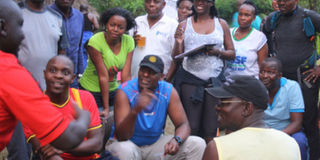A tour company born out of adventure

A group of NSSF employees during a tour to Sipi Falls in Kapchorwa District. The tour was planned by Kakungulu Safaris. Photo by Edgar Batte
Steven Waswa Kirama used to enjoy adventure excursions with friends at the weekends. One day his wife, Rachel, started complaining that he was spending a lot of time at the workplace and the only time he could have spent with family, he was away on adventure.
She challenged her husband to stay home or else they start making commercial sense out of his expeditions. Kirama started thinking about it, sharing and putting together adventure products for a fee. In June 2014, the fruition of their intellectual exchanges gave birth to Kakungulu Safaris, a tours and travel company.
An accountant by profession, Kirama had had enough of auditing books after a decade working with a bank. When the safari company got on its feet, he went in full throttle.
Kakungulu Safaris focuses on adventure tourism. The couple’s target market includes corporate companies for team building events or groups of friends and families for fun excursions within East Africa.
Once the agency has confirmed with a client on the destination, number of people and the duration of stay, they get in touch with the destination and negotiate on behalf of the group for the cost of food, accommodation, cost of activity and transport.
As a tour operator, Kirama has had to do some homework and research to be able to make business sense in the tourism sector. He advises anyone planning to join the sector to have knowledge of the industry.
“Anyone keen on joining the industry should first start as a tour guide to learn how the industry works, how to invest your capital, how and what to market, pricing and packaging, among others,” he says.
Business at the beginning is slow because it is a referral-based industry whereby new entrants with no track record take time to pick up. Kirama, therefore, observes that it is important to have another stream of income to support one’s daily needs as they penetrate the industry.
Given that the company is run by two directors, Kirama recalls that they had diversity of direction for the business since they were both new in the trade. But as time went on, they gained congruence in strategy and now make faster decisions.
“Learning is an ongoing requirement in whatever you do. Always network with experts in the various industries that you choose to play in. Involve your next of kin in your business so that you have a trusted partner to delegate work to in case you are away,” Kirama advises, adding that involving partners helps business survive beyond death or permanent disability of one director.
He adds: “My wife Rachel has been the most instrumental party encouraging me and adding value in whichever way she could.
She used her business revenues to settle bills and various other needs to allow the business to get off the ground. I will forever be grateful to her for this support.”
Inspired to keep on track
Listening to other people’s experiences has also given the couple motivation to stay in the business however tough times get. They also stay strong in the lord and have faith in His deliverance.
In tourism business, it gets tough when clients make late cancellations, or when tour operators make miscalculated costing creating losses and lost business.
In such times, the couple has had inspirational stories from renowned entrepreneurs such as Richard Branson, Nick Vucinic, Amos Wekesa, Patrick Bitature and Aliko Dangote to keep going.
“I would also recommend a book called “Success is never ending, Failure is never Final” by Robert H. Schuller for anyone starting a business or embarking on an ambitious project,” Kirama says.
What counts for him while on an expedition is planning, time management and client experience. He roots for promotion of tourism locally for a continuous traffic flow even during off peak periods.
He cites lack of information within domestic domain on what there is to do, how much it costs and how to experience it as a hindrance.
“We underestimate the value of repeat business from our domestic market which could potentially bridge our off peak revenue gaps as well as create awareness amongst the locals on what Uganda has to offer,” Kirama says.
Challenges in tour business
Drawing a line between margins and business money especially when clients paid in advance, was a challenge because it is a thin line between spending clients’ money on non-business activities and the actual business.
This always happened when costs were not confirmed upfront with service providers and they changed adversely along the way. The couple initially made the mistakes but have since learnt the lessons.
Kirama advises that any business idea should be driven by a need within one’s community. There must be a need, otherwise sales or revenues will struggle. It is also important to start small at the earliest opportunity and grow with the business.




